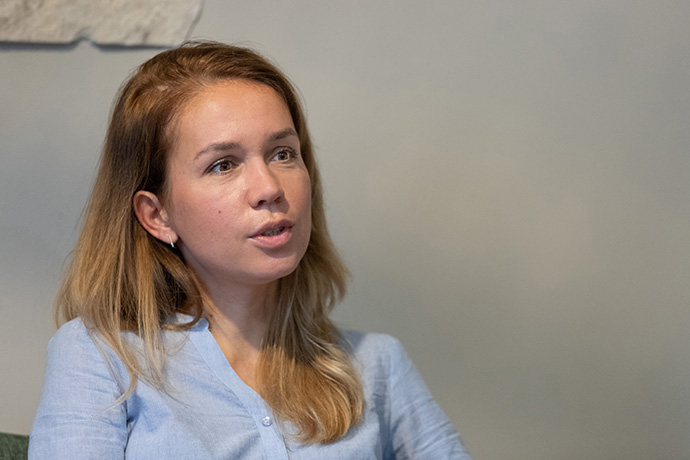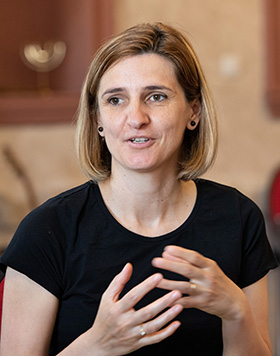
Key points:
- Olena Koval, a therapist who fled Kyiv when the war began, had an idea to create therapy groups for women refugees after seeing that none existed.
- Members of The United Methodist Church in Romania offered space for her to host group sessions as well as a private room for individual counseling.
- The church is looking into partnerships to help train more therapists in the community.
Editor’s Note: In late May, a team from United Methodist News, the United Methodist Committee on Relief and the United Methodist Board of Global Ministries visited church refugee ministries in the Czech Republic, Hungary, Romania and western Ukraine to share stories of the United Methodist presence in the wake of such tragedy and ongoing need.
Olena Koval said it is “providence” that brought her to the Hotel Hanul Fullton, a hotel and ministry center run by The United Methodist Church in Romania.
She’s from Kyiv and even before the Feb. 24 Russian invasion of Ukraine, Koval had planned to relocate to Turkey, where her sister lives. But the war caught her off guard.
“The war came suddenly; I wasn’t prepared, didn’t have an emergency bag,” she said. “I grabbed my daughter, two T-shirts, two toothbrushes and my dog, and jumped in the car. I headed to Turkey, but Romania was on my way.”
After a night’s stay at a hotel, she began considering her next steps. In addition to possibilities in Turkey, other friends had invited her to stay with them in Bratislava, Slovakia.
“Those are two completely opposite directions from where I was in Romania — I was ready to flip a coin,” she said.
While running some errands, she accidentally scratched someone’s car while parking hers. The other driver noticed her car was from Ukraine and asked whether she had somewhere to stay. When she said she didn’t, he offered up an empty house he owned.
Once she had shelter, she began to think of what she wanted to do.

Koval is a therapist and ran a private practice in Kyiv. She had an idea to create therapy groups for women after seeing that none existed.
“I met a lot of women in places where kids were busy with activities, but I saw Ukrainian women who were quite upset. However, it wasn’t the place to talk to them about what was going on,” she said.
The same providence that kept her in Cluj-Napoca also brought her in contact with The United Methodist Church. She met Anca Beu, project manager for Asociatia Phoneo, one of the nonprofit ministries the church runs out of the Hotel Hanul Fullton. Beu offered space for the group sessions to be held.
“Most wives are alone and the biggest worry is their husbands,” said the Rev. Rares Calugar, superintendent of The United Methodist Church in Romania, who said the numbers at the group sessions have been as high as 50. “When the Ukrainian ladies heard the stories of the others, it helped them understand they are not alone in their struggles.”
In the beginning, Koval said, she focuses on crisis help, where she explains how the brain reacts to the kinds of stress the refugees have endured. But she said after the initial crisis is addressed, any issues they already struggled with come back to the surface. In addition to group conversations, she offers practices like art therapy.
“With the people already in group therapy, the chances for PTSD are less than for those who don’t have psychological help,” she said.
The Rev. Jack Amick, director of global migration for the United Methodist Committee on Relief, agreed.
“Trauma is the hardest piece,” he said. “People are really fragile, but they may be hiding that fragility because they’ve had to for so long. They get to a place like this and they can let their guard down, and stuff comes back.”
Koval is now on Asociatia Phoneo’s paid staff. In addition to hosting the group sessions, the church created a space for her to conduct private individual sessions, where she works mainly with teens and adults. Since she’s not licensed to work with children, she wants to find counselors who are.
She hopes to create a group for teens as well, and is working to organize a community of Ukrainian- and Russian-speaking psychologists in the area to provide more help than she can alone.
How to help
To donate, please give to UMCOR’s International Disaster Response and Recovery fund, Advance #982450, or UMCOR Global Migration, Advance # 3022144.
“Teens are the most vulnerable group. They’re facing their own crises in their lives on top of the war, and so it’s double the stress,” she said.
Calugar also has hopes to expand the counseling services the church can offer. He said they are discussing a trauma project with a university in Holland that would train counselors online to increase the number of available therapists in the community, and UMCOR has provided a grant to cover the church’s contribution to the project.
Gabriela Lupea, an assistant at Asociatia Phoneo, said there’s an immediate need for trauma therapy for refugees, “not in 20 years when they try to understand what happened to them.” She is also project manager for the trauma project with the Holland university.
Lupea said that psychology and therapy “are important for each one of us because everyone has their own brokenness. A counselor can get into our hearts and heal them in a different way than God does. Maybe God goes through them to help us.”
Since she also was displaced by the war, Koval said she often has the same questions that her clients do — about where her place is and where she wants her life to go. For now, she trusts that she is where she is supposed to be.
“It was by providence, of course, that I am here. It wasn’t my plan. I’ve never been in Romania before, but I feel comfortable here,” she said.
Butler is a multimedia producer/editor for United Methodist News. Contact him at (615) 742-5470 or [email protected]. To read more United Methodist news, subscribe to the free Daily or Weekly Digests.




